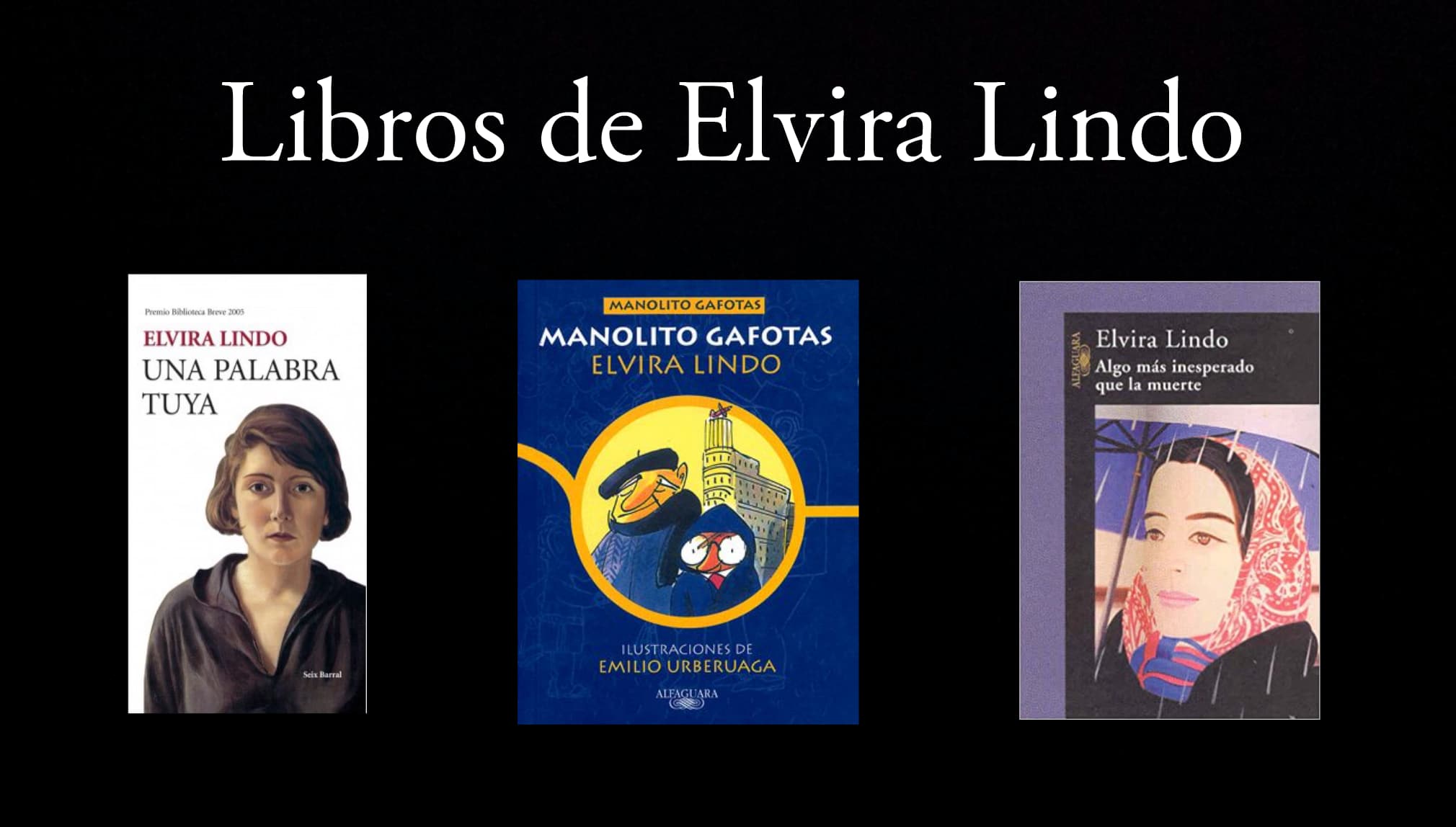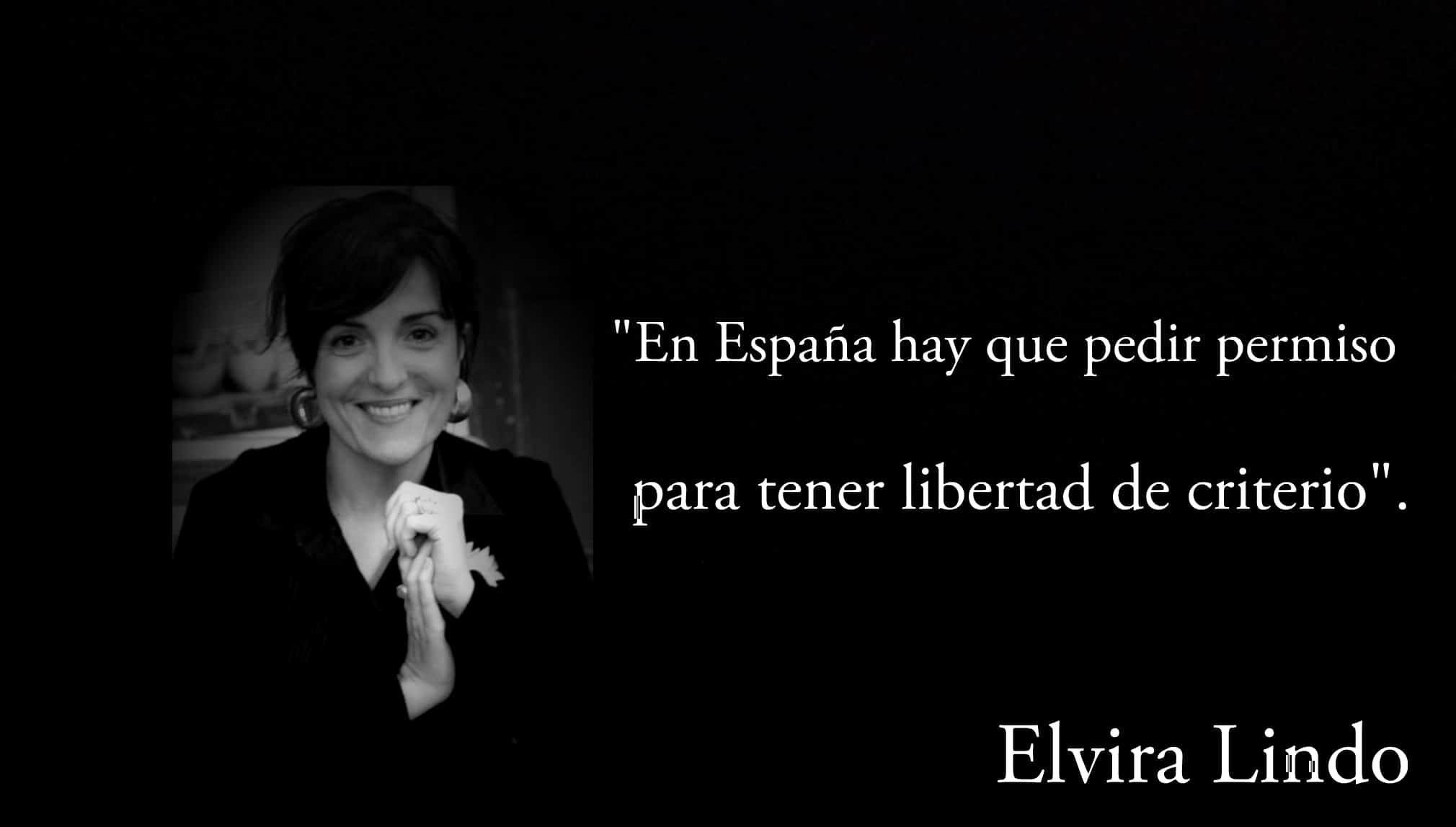
Elvira Lindo's books.
Elvira Lindo's books are Obligatory reference of children's literature in the virtual and physical world. More than a consecrated writer, this author is an integral artist who has achieved success in multiple genres. His texts range from children's readings to stories for adults or scripts for film and television. Of course, thanks to Manolito Gafotas —Her first written publication— Lindo is known primarily as a children's story writer.
The character “Manolito” earned him the 1988 National Prize for Children's Literature and has served as the inspiration for seven other books. In addition, Lindo has a recognized career as a journalist, actress and broadcaster, with a very prominent career in radio. In his long professional career, he has collaborated with various prestigious media, among them, El País, SER chain, TVE y Tele 5.
Biography of Elvira Lindo
Nacimiento
Elvira Lindo Garrido was born on January 23, 1962, in Cádiz, Spain. He moved with his family to Madrid after turning twelve. After completing high school, he began studying journalism at the Complutense University of Madrid, although he never graduated. At the age of 19 she got her first job as an announcer and scriptwriter on the National Radio of Spain.
Manolita Glasses
The launch of Manolito Gafotas in 1994 it meant a literary debut in style. She is a character built by herself originally for the radio. Manolito is the protagonist of a series full of humor, irony and harsh social criticism. Olivia is another of his important childhood characters; He has dedicated seven books to her in total, released between 1996 and 1997.
His literary evolution
In 1998 Elvira Lindo published The other neighborhood. It is a novel directed to an adult audience, However, his argument was very popular among teenagers because its protagonist is 15 years old. Its enormous popularity justified the later adaptation of this title to the cinema. Additionally, Lindo published another ten narratives for adults, among which the books Something more unexpected than death (2002) and A word from you (2005)
Towards the end of the 90s, Elvira Lindo began a solid career as a screenwriter cinematographic. In 1998 he co-wrote with Miguel Albadalejo The first night of my life. Shortly after, the first adaptation of Manolito Gafotas. In 2000 he adapted the novel Plenilunio of the writer Antonio Muñoz Molina, with whom he married. To date, Lindo has written a total of eight screenplays.
His other literary facets
Likewise, the Cadiz author has been a columnist and collaborator in various newspapers and magazines, especially in El País. Much of his articles have been compiled in the book series Summer red (2002, 2003 and 2016) and Gift of people (2011). In addition, the Spanish writer has ventured into non-fiction with Nights without sleep (2015) and 30 ways to remove your hat (2018)
Manolito Gafotas Series
According to Sonia Sierra Infante (2009), the character Manolito Gafotas is “one of the great milestones of Spanish culture in recent decades”. Its radio genesis in the voice of the author herself has given way to nine books (with numerous editions), multiple awards and seventeen translations. Likewise, this work appears in many textbooks, pedagogical proposals, web pages, television series, feature films ...
In his doctoral thesis for the University of Barcelona, Sierra Infante explains: "the radio origin is decisive when choosing a narrative voice". Well, “the choice of a voice regulates the narrator's control over what is narrated and from this choice arises, in turn, the position that the reader occupies (a peer, a confidant or a distant guest). In this case it seems clear that the most accurate was the first person singular ”.
Manolito Gafotas (1994)

Elvira Cute.
The main characters appear involved in different adventures (apparently unrelated to each other) in indeterminate years in the town of Carabanchel. However, chronologically they can be placed between the day before the start of classes and April 14 (grandfather's birthday). This date coincides with the declaration of the Second Republic, (a clear hint of the political inclination of his family).
Poor Manolito (1995)
The protagonist becomes more reflective about his role as a public figure. At the beginning he makes a summary of the characters of this second installment and their relationship with those of the predecessor book. The events are narrated by Manolito in the "second volume of the great encyclopedia" about his life. The themes revolve around gratitude (towards his friend Paquito Medina), fear and the uselessness of white lies in the face of the inevitable.
As molo! (1996)
New characters appear in the life of Manolito and his loyal companion, Paquito Medina. Among them, a boy who comes to Carabanchel to ask Manolito some questions about his previous volume. Also, breaks into the adventures of the protagonists "the Mustard", a classmate mentioned superficially in the previous installments.
Dirty laundry (1997)
In the prologue, Manolito reviews and assumes the consequences of publishing the writings about his own life (with the subsequent loss of privacy). In the narration, reality and fiction are mixed, plus the appearance of Elvira Lindo herself in the prelude. This book received excellent reviews due to the treatment of subjects such as envy and jealousy, from a child perspective.
Manolito on the road (1997)
Unlike previous books, where the adventures related are not always related, in this text the sequence is a single story. It narrates the experiences of Manolito during a trip with his father. It deals with humorous topics as diverse as consumerism, diseases and family life. It is divided into three parts: "Goodbye Carabanchel (Alto)", "The week of Japan" and "The fox of Malvarrosa".
Me and the jerk (1999)
In this publication, Lindo expands on a trend started in the previous book: inquiring about the limits of what is politically correct. The text is structured in three parts: "Your grandchildren do not forget you", "Two quite forgotten children" and "The thousand and one nights". In turn, with several subdivisions referring to the antics of Manolito and his little brother (the Imbécil), during the week of the grandfather's hospitalization for a prostate operation.
Manolito has a secret (2002)
The text is divided into a succession of chapters that narrate the visit of the Madrid mayor to the Carabanchel school. Lindo takes advantage of the context to criticize the hypocritical attitude of politicians in these types of events. Some of these shows — as in the case of Manolito's class — tend to be disastrous. There are parts of this book continued in "Flying Chinese", in writings of the writer for the supplement The weekly country.
Best Manolo (2012)
Ten years later, Manolito's world has been transformed. He has grown up and his jealousy towards the Moron (his younger brother) has diminished because now "Chirly" is the little princess of the family. Of course, there is no lack of his father Manolo, mother Cata, his grandfather Nicolás, the "Orejones", Jihad ... Nor have their acute vision of reality changed, the abundant ironic comments and the always fresh humor.
Olivia Series
It is a series of comics written for an audience between three and six years old. They are superbly illustrated by Emilio Urberuaga in order to facilitate their integration into the teaching of reading. The theme focuses on the typical interests and fears of children in these stages.
Except Olivia and the letter to the Magi (1996), the other titles about the character appeared during 1997. They are mentioned here below:
- Olivia's grandmother is lost.
- Olivia doesn't want to bathe.
- Olivia doesn't want to go to school.
- Olivia doesn't know how to lose.
- Olivia has things to do.
- Olivia and the ghost.
Other stories of children and youth audiences

Phrase by Elvira Lindo.
In them, the drawings of Emilio Urberuaga constitute a very useful resource during the first steps of reading in children. Full-color images are displayed in keeping with the narration and serve as a very effective medium for conveying information. These guidelines are evident in Charanga and tambourine (1999) and He was a great draftsman (2001); as well as the following titles:
Soul friends (2000)
It is a beautiful narrative that revolves around the vicissitudes of the friendship between Lulai and Arturo. Topics such as adoption (Lulai is actually Chinese and was adopted when she was three years old), forgiveness and reconciliation are described. It is a work in which Elvira Lindo highlights human warmth above any ethnic, social or cultural condition.
bolinga (2002)
In this publication, the writer from Cádiz puts herself in the shoes of a gorilla saved by naturalist John Graham. Lindo tells the story from the point of view of the ape, who does not understand the incongruous (and cruel to nature) behavior of humans. Despite the predominant humorous tone, there are spaces of nostalgia - when he remembers the death of his mother - and romanticism.
About his novels for adults
Elvira Lindo has shown with her books for adult audiences that she masters different facets of literary creation. En Something more unexpected than death (2002), Lindo portrays a "cliché" marriage between an elderly wealthy writer and a young journalist. Delve into the miseries and weaknesses of the protagonists, as well as the prejudices of those around them. Because in almost everyone's eyes, she married out of interest and not out of love.
On the other hand, in A word from you (2005), the main characters are two street sweepers with two very different perceptions about their occupation. While the furious Rosario is frustrated, the tender Milagros rejoices that she has landed a steady job. While Rosario believes she has led an unhappy life (and blames everyone for it), she eventually discovers that Milagros does have a truly tragic record.
Elvira Lindo: a writer full of vitality
In the interview conducted by Nuria Morgado (Arizona Journal of Hispanic Studies, 2005), Elvira Lindo described some of the situations inherent to literary creation. In this regard, the artist from Cádiz affirmed “… the bad thing about writers is that they become the property of experts. It seems that you can not do anything of those who have already asked for it ”.
At the end, Lindo leaves the following sentence: “So I didn't write anything (in reference to a project about Lorca), but for me it was something very emotional. So I would like to thrill with my novels. That is to say, when my novels are read in a while, they think that I have been a person who has lived intensely, and that this vitality could be felt ”. And since it does not stop, he has already written his next novel Open heart to surprise your audience again.